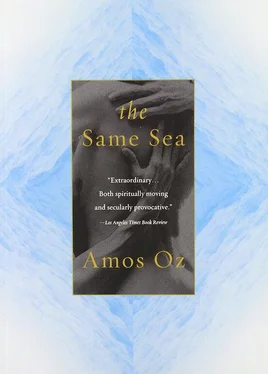Amos Oz - The Same Sea
Здесь есть возможность читать онлайн «Amos Oz - The Same Sea» весь текст электронной книги совершенно бесплатно (целиком полную версию без сокращений). В некоторых случаях можно слушать аудио, скачать через торрент в формате fb2 и присутствует краткое содержание. Год выпуска: 2001, Издательство: Houghton Mifflin Harcourt, Жанр: Современная проза, на английском языке. Описание произведения, (предисловие) а так же отзывы посетителей доступны на портале библиотеки ЛибКат.
- Название:The Same Sea
- Автор:
- Издательство:Houghton Mifflin Harcourt
- Жанр:
- Год:2001
- ISBN:нет данных
- Рейтинг книги:4 / 5. Голосов: 1
-
Избранное:Добавить в избранное
- Отзывы:
-
Ваша оценка:
- 80
- 1
- 2
- 3
- 4
- 5
The Same Sea: краткое содержание, описание и аннотация
Предлагаем к чтению аннотацию, описание, краткое содержание или предисловие (зависит от того, что написал сам автор книги «The Same Sea»). Если вы не нашли необходимую информацию о книге — напишите в комментариях, мы постараемся отыскать её.
The Same Sea Reminiscent of
for the range of its voices, its earthy humor, and its poignancy,
is heartbreaking and sensuous, filled with classical echoes and Biblical allusions. Oz at his very best.
"I wrote this book with everything I have. Language music, structure everything that I have. . This is the closest book I've written. Close to me, close to what I always wanted. . I went as far as I could. -Amos Oz
The Same Sea — читать онлайн бесплатно полную книгу (весь текст) целиком
Ниже представлен текст книги, разбитый по страницам. Система сохранения места последней прочитанной страницы, позволяет с удобством читать онлайн бесплатно книгу «The Same Sea», без необходимости каждый раз заново искать на чём Вы остановились. Поставьте закладку, и сможете в любой момент перейти на страницу, на которой закончили чтение.
Интервал:
Закладка:
contrasts with the Narrator, who is well known to be a punctilious person
who always puts each thing away in its proper place. But that is only
on the outside. Inside him too there is an almighty mess.
And we are both always thirsty. Incidentally, a pig in a poke is an expression
that generally describes an incautious purchase but in our case connotes
not so much the impetuosity of the purchaser as the condition of the pig.
Sometimes we encounter a spider or a cockroach in the kitchen, which
we would never dream of hurting, but when the creature runs away from us
we take offence. And in general we are easily hurt:
we are constantly offended but contain ourselves, and continue to invite
further offence. With women he has a harder time of it the Narrator
is apparently helped by a certain glow, at least on the surface. Like
the producer, he feels not entirely worthy, like a con man obtaining favors
by deception: be my mother, my sister, etc. Not to mention the feet that both
characters are a bit like David, who always longed to adopt a gentle brother
and a tough-warm father, a grim father whose manner toward his son implies
a suppressed rebuke. And yet, adopting a father, as can be seen
in the case of David, generally ends up in a battle in which the father's role
is to fall, thus restoring to us the liberties of orphanhood. And,
it may be added, both the unsuccessful producer and this Narrator
know the summer will soon be over.
Synopsis
To sum up the story so far, this is actually a tale about five or six characters,
most of whom are alive most of the time, who often offer each other
a hot or cold drink, generally a cold one, because it is summer. Sometimes
they bring each other a tray with some cheese and olives, some wine, slices
of watermelon, occasionally they even make each other a light meal. Or else
you could see it as a number of intersecting triangles. Rico his father and
his mother. Dita and her two lovers (Giggy Ben-Gal doesn't count). Albert
between Bettine Carmel and his child bride who slips from room to room
wearing no more than the shirt on her back. And Bettine herself, between
Avram and Albert, her choice for a rainy day. While Dubi is stuck
between his desire for Nirit and the rebuke of her warm-hearted
representative on earth, to the love of women preferring the reproach
of the sensible father. Rico, between his father and his cross, mistakenly
searching in the mountains for his sea-tossed mother, in love with Dita
though not loving her enough. Dita who is still waiting. And all of them are
among shadows. Even the Narrator himself is somewhere between
the mystical and the mischievous. This fabric resembles
the pattern in the curtain at the Greek necromancer's, who died and
left in his place a crow-woman. She has no living soul and her fabric gives
a foretaste of the worm. And so a certain shadow falls over this story too.
The peace process
Hadhramaut. On his map such a principality appears in southern
Arabia, east of Bab el-Mandeb. Maybe the peace process
will open it up to us. But what is there there) Shifting sands,
wilderness, the haunt of foxes. But what is there here, in this abandoned
temple? A solitary Buddhist monk, a skeletal figure, through a hatch
wordlessly handing you a bowl of cold rice
and disappearing. He will not open the gate: you are not worthy yet.
In other words, the peace process is slow and painful. You will have
to make one or two further concessions. Only what is truly
a matter of life and death should not be negotiable.
In the middle of the hottest day in August
At Giggy Ben-Gal's, in Melchett Street She is sleeping with him again
because she feels sorry for herself While he saws away, she is thinking of
dear, good Albert, who worked so hard to find her
a one-room flat in Mazeh Street, the unfashionable side. On the
one hand it's good news, but on the other she really doesn't want
to move out. She enjoys living with him, he makes such a fuss of her
and his devotion is touching, not to mention his hungry look. All
the sweeter for being forbidden. This Giggy is a big brute. He fucks
as though he's hammering in nails or scoring points. One way
or another, in the end everyone is alone. In this heat
the best thing to be is a Buddhist nun in Tibet.
The riddle of the good carpenter who had a deep bass voice
In fact they were distantly related, both born in Sarajevo, Albert Danon from Bat Yam and my carpenter Elimelech who made this desk for me and died nine years ago. The great love of his life, apart from his wife and daughters, was opera: he had a stereo at home, another in his workshop, and a third in the car, hundreds of records and cassettes, dozens of performances. You could tell from two streets away if the workshop was open, not from the buzzing of the electric saw or the smell of sawdust and wood glue, but from the music: La Traviata, Don Giovanni, Rigoletto, the man was a total addict. We called him Shalyapin, because while he was planing away he would be roaring and booming, shamelessly out of tune, plunging so low as to put the deepest bass to shame. His voice was like the voice of the dead: a profundo de profundis. And yet this thunderous bass sound burst forth from a chest of modest dimensions, in fact Elimelech the carpenter was actually a slightly built man; his face was wrinkled with irony, one eyebrow was raised, and his glance contradicted itself: partly asking forgiveness and partly impish or sarcastic, as if tb say, Who or what am I, but then you too, sir, excuse me for mentioning it, began as a drop of moisture and will end up as a broken vessel. The desk he made me, on which I am writing these words, turned out heavy. Massive. With no frills. A desk with the legs of a rhinoceros and sides like the shoulders of a market porter. A bass table. A proletarian object, thickset as a wrestler. Unlike Elimelech the carpenter, a man who loved to joke and tease but at the same time was being secretly, relentlessly eaten away by a ruthless canker, until one day he upped and hanged himself. He left no note, and no one could explain it. Least of all his wife and daughters. When I went to the hanged man's house to offer my condolences, I had the impression that grief had been displaced by surprise: as if all those years it had never occurred to them that here in their home an alien being was living among them in disguise, a maharajah masquerading as a woodworker, and one day he had been summoned home, and at once, without a word, had shed his familiar disguise and set off for the place where he belonged. The last man, literally the last man in the world, to go and hang himself. For the life of us we wouldn't have dreamed that he had it in him. And there was no reason either: all things considered, life treated him very well, he had a family, friends, made a decent living, and he was the kind of man who was, as they say, content with what he had and always made the most of things. For instance, he loved eating, he loved to sit in his armchair every evening and fall asleep with the paper, and he especially loved those operas of his; he used to listen to them and sing along from morning to night and, well, we did think it was a bit much at times but we kept our mouths shut, why shouldn't he have a bit of pleasure? There are some husbands, after all, who squander half their pay on the lottery and suchlike, or who are crazy about football, and with him it was his operas. You must agree, sir, that it's a refined hobby. And also, he loved to make people laugh, he was a champion joker, he was the king of practical jokes, you may not believe this but just the morning of the day it happened, barely three hours before, he was making omelettes for the girls and he pretended to swallow the hot oil straight from the frying pan. What a fright we had before we started to laugh. What else can I say to you, sir, people are a riddle, even the ones you think you know best. You sleep in the same bed together for thirty-five years, you know every hair on their head, their illnesses, their secrets, their problems, their most personal things, and then suddenly it turns out that It's as if there was two Elimelechs, one for foreign affairs and one for internal affairs. It was nice of you to come. Thank you. We'll do our best. The girls are just wonderful, look how they take after him. They take everything as it comes. When you next see Albert say a big thank you to him for taking the trouble to come to the funeral. He's not a youngster any more, and it's a long way from Bat Yam, after all.
Читать дальшеИнтервал:
Закладка:
Похожие книги на «The Same Sea»
Представляем Вашему вниманию похожие книги на «The Same Sea» списком для выбора. Мы отобрали схожую по названию и смыслу литературу в надежде предоставить читателям больше вариантов отыскать новые, интересные, ещё непрочитанные произведения.
Обсуждение, отзывы о книге «The Same Sea» и просто собственные мнения читателей. Оставьте ваши комментарии, напишите, что Вы думаете о произведении, его смысле или главных героях. Укажите что конкретно понравилось, а что нет, и почему Вы так считаете.












